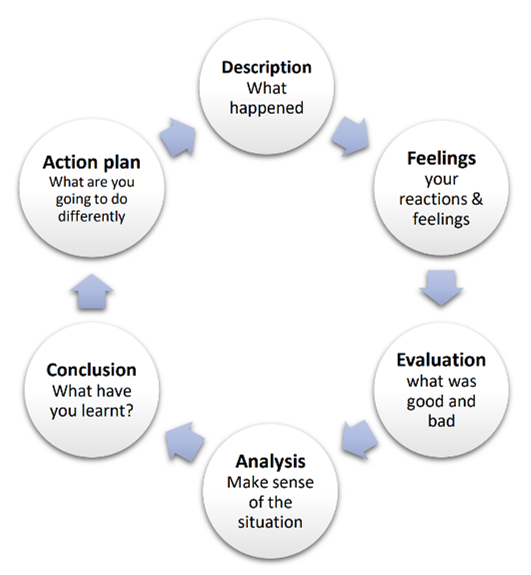Asking For Help
The organisation I have chosen for my work placement is Kabosh Theatre. I work in their office, where the company manages its funding and advertising. In this blog entry, I will reflect on my experience of working with them on my first day and assess how well I achieved the task I was given. To help illustrate this, I will use Gibbs’s Reflective cycle in my writing.

First Day
I worked alongside the artistic director and the general manager on this day. They gave me the simple task of organising the company’s collection of DVDs containing past performances and audio files. I had to sift through them to find working recordings of these productions and upload them to a digital theatre archive. However, this led to some issues as the content of certain DVDs could not be uploaded with the program I was using. Eventually, I had to ask my associates for help and they directed me to a more reliable program to use. This allowed me to start putting their performances onto the theatre archive.
Thoughts
As this was the first task I was given, I was wary that I had to do it efficiently and competently. I thought that as the task seemed simple enough, I would not need any help from my workmates, but they were happy to give me a hand when I reached the obstruction in my work. A similar situation had occurred before so they had a solution to the issue I was having. Afterwards, I found that my task had still not been completed and so would have to be resumed the next day. I realised then that it would have saved time if I had asked for help sooner rather than try to fix the problem myself.
Looking Back
I also found that I could have been more efficient at completing the task. I neglected to keep the DVDs organised which caused further difficulties the next day as I struggled to find more productions to upload. Additionally, because I was hesitant to ask for help from my associates, I did not upload as many performances as I could have. Furthermore, the productions I uploaded could only be done so in separate parts rather than a full video and as my associates wanted one video for each show, I was not able to put them onto the Kabosh Theatre YouTube channel yet. Despite this, the task was not particularly difficult for my first day and I was able to get a number of performances onto the film archive once I was using the appropriate software.
Evidence and Research
My first task may have gone poorly due to a lack of communication. The book Managing your Placement states that, “Effective communication only exists when a message is received, understood, accepted and correctly acted upon. The process is about transferring knowledge, changing opinions and issuing instructions”.[2] In my case, if I had decided to engage in a conversation sooner, I might have been able to complete more of my work. The Handbook of Work-based learning divides communication into four different terms: direction, debate, dialogue and discussion.[3] It describes discussions as, “an exchange of views, ideas and information”.[3] It states that a discussion can have a positive effect on workplace environments as it allows for new ideas to emerge.[4] Rather than discussing the situation with my associates, I kept to myself and attempted to find my own solution which only wasted time.

Learning from Mistakes
I have now learnt that it is integral I be more outspoken in the workplace, especially when I am experiencing difficulties with my tasks. This experience has taught me the importance of asking for help when you need it and not to struggle with your work in silence. Since then, I believe I have gotten to know my other workmates better and I’ve adjusted to my office space so I feel more comfortable asking for help when I need it. To facilitate this, I should develop my communication skills in order for me to accurately convey my needs. At the same time however, I believe I should learn to be independent and refrain from asking for help too much.
Future
The next time I experience difficulties with future jobs and projects, I will look to my teammates for support. To achieve this, I will engage in regular conversation with my work associates and inform them on any progress with my work. When encountering a roadblock in my tasks that I am unable to overcome, I will ask them for help to solve the problem. Managing Your Placement gives particular emphasis to being assertive and provides a number of statements that outline the term, such as “Asking for what I want, rather than hoping someone will notice what I want”.[6] I plan to adopt this phrase throughout the rest of my placement and in the future.
Word Count: 802
References:
[1] University of Cumbria, ‘Gibbs’ reflective cycle’, in Reflection <https://my.cumbria.ac.uk/media/MyCumbria/Documents/ReflectiveCycleGibbs.pdf> [Accessed: 16 October 2021].
[2] Ian Herbert and Andrew Rothwell, Managing Your Placement A skills-based Approach (Hampshire and New York: Palgrave Macmillan, 2005), p. 76.
[3] Ian Cunningham, Graham Dawes, Ben Bennett, The Handbook of Work-Based Learning (Aldershot: Gower, 2004), p. 181.
[4] Cunningham, Dawes, Bennett, p. 184.
[5] Vaibhav Bansal, ‘How to ask for help at work?’, in Life Skills Simplified <https://www.lifeskillssimplified.com/2020/06/how-to-ask-for-help-at-work.html> [Accessed: 26/11/2021].
[6] Herbert and Rothwell, p. 190.
Bibliography:
Cunningham, Ian, Dawes, Graham, Bennett, Ben, The Handbook of Work-Based Learning (Aldershot: Gower, 2004)
Herbert, Ian, and Rothwell, Andrew, Managing Your Placement A skills-based Approach (Hampshire and New York: Palgrave Macmillan, 2005)
University of Cumbria, ‘Gibbs’ reflective cycle’, in Reflection <https://my.cumbria.ac.uk/media/MyCumbria/Documents/ReflectiveCycleGibbs.pdf> [Accessed: 16 October 2021].
Me, my CV and a Man called Larry
A kid in a candy shop
You May Also Like

In at the Deep End: Recording an Orchestra
26 November 2021
Feast vs Famine
26 November 2021
